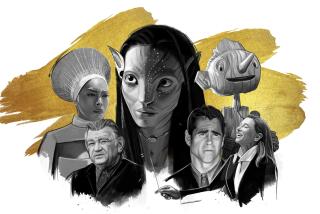Proposed bills seek to rewrite media rulebook
Looking to bring an end to channels going dark as a result of contract disputes between broadcasters and pay-TV distributors, two lawmakers are proposing legislation that could radically alter the media landscape.
Reps. Anna Eshoo and Zoe Lofgren, both California Democrats, on Thursday introduced the Video CHOICE (Consumers Have Options in Choosing Entertainment) Act, which was praised by pay-TV distributors and criticized by broadcasters.
“My bill would put an end to broadcast television blackouts and ensure consumers aren’t held hostage by a dispute they have no control over,” said Eshoo, who is ranking member of the House Communications and Technology Subcommittee. Lofgren, a senior member of the Judiciary Committee, added, “this bill offers the basic consumer protections and choices they should receive in television and online services.”
ON LOCATION: Where the cameras roll
The bill looks to give the Federal Communications Commission authority to keep a broadcast channel on during a contract dispute. Last summer, CBS went dark on Time Warner Cable for a month. The FCC has previously indicated a lack of desire to weigh in on business negotiations between programmers and distributors.
Also in the bill is a provision that would prohibit a broadcaster from tying carriage of its television stations with distribution of its cable networks. Such bundling is commonplace in the industry. Walt Disney Co. and 21st Century Fox, for example, often package their broadcast stations with their cable networks in deals with distributors.
Eshoo and Lofgren weren’t the only lawmakers looking to overhaul the media industry. Rep. Steve Scalise (R-La.) another member of the Communications and Technology subcommittee, introduced new legislation as well.
The Next Generation Television Marketplace Act seeks to overhaul much of the current Communications Act, including retransmission consent rules and the compulsory copyright that was established in 1976 and allows cable and satellite operators to distribute broadcast television programs in return for paying a one-size-fits-all copyright fee.
PHOTOS: Billion-dollar movie club
“Over the last several decades, communications and entertainment technology has become more advanced, while the laws governing the industry have remained relatively unchanged,” Scalise said. “The government should not be in the business of picking winners and losers, and the Next Generation Television Marketplace Act ensures that by removing the heavy hand of government, the market is free to operate in a way that continues to benefit consumers and encourage innovation.”
Several major pay-TV distributors, including DirecTV and Time Warner Cable, have offered their support of the Eshoo and Lofgren bill. There likely will be similar praise for Scalise’s bill.
However, broadcasters, through the the National Assn. of Broadcasters, came out against both efforts.
“NAB and America’s local broadcasters respectfully oppose both of these bills. We will constructively engage with policymakers seeking to improve upon a retransmission consent law that is now working over 99 percent of the time,” the lobbying group said in a statement.
ALSO:
Aereo will not fight broadcasters’ Supreme Court play
Movie screenings highlight Union Station’s role in films
Brad Pitt’s Plan B Entertainment exiting Paramount Pictures
Follow Joe Flint on Twitter @JBFlint.
MORE
ON LOCATION: People and places behind what’s onscreen
PHOTOS: On the set: movies and TV
PHOTOS: Celebrity production companies
More to Read
From the Oscars to the Emmys.
Get the Envelope newsletter for exclusive awards season coverage, behind-the-scenes stories from the Envelope podcast and columnist Glenn Whipp’s must-read analysis.
You may occasionally receive promotional content from the Los Angeles Times.








